The event is conducted only in the Polish language.
Bilet wstępu na multimedialne wykłady Prosto z nieba można zakupić przez internet na naszej stronie lub w kasach. Bilet normalny 34 zł, bilet ulgowy 24 zł. Liczba biletów ograniczona!
The event is conducted only in the Polish language.
Bilet wstępu na multimedialne wykłady Prosto z nieba można zakupić przez internet na naszej stronie lub w kasach. Bilet normalny 34 zł, bilet ulgowy 24 zł. Liczba biletów ograniczona!
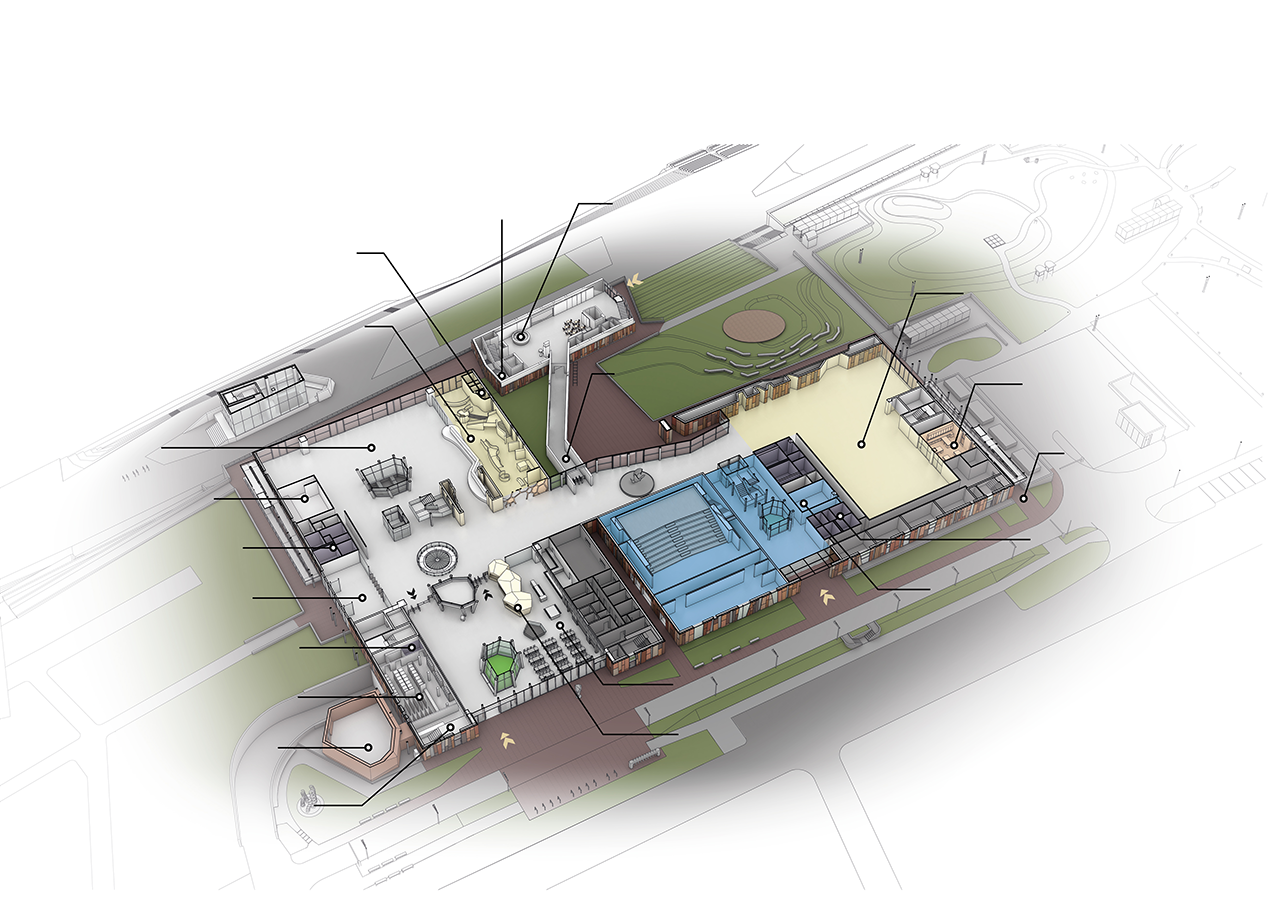

Cykl „Prosto z nieba” to niezwykłe, multimedialne pokazy w planetarium, połączone z rozmowami z wybitnymi specjalistami. Podczas spotkań dowiesz się więcej o najnowszych osiągnięciach nauki, badaniach kosmosu i gwiezdnych ciekawostkach. Spotkaniom towarzyszyć będą niezwykłe wycieczki po odległych galaktykach, a Ty będziesz mógł bezpośrednio i w przystępny sposób podyskutować z prawdziwymi naukowcami.
Polecamy od 12 lat.
Dowiedz się więcej o najbliższych spotkaniach.
Polska zaczyna budować własną flotę kosmiczną! W najbliższych latach na orbitę trafią kolejne polskie satelity, a krajowy sektor kosmiczny będzie jednym z najszybciej rosnących segmentów wysokich technologii, planowo przyjmując w ciągu zaledwie kilku lat ponad tysiąc nowych specjalistów.
Dlaczego świat przesiada się z pojedynczych dużych satelitów na konstelacje wielu mniejszych? Jak w ten trend wpisują się polskie systemy obserwacji Ziemi? Jakie znaczenie ma to dla gospodarki, bezpieczeństwa i codziennego życia? Opowie o tym dr Jakub Bochiński, który pracuje przy polskich misjach realizowanych we współpracy z Europejską Agencją Kosmiczną i krajowymi instytucjami publicznymi. Nasz gość przedstawi także drogę od pomysłu na misję do działającej konstelacji na orbicie.
dr Jakub Bochiński – dyrektor w Creotech Instruments S.A. – największej polskiej firmie z branży kosmicznej. Zajmuje się strategią rozwoju produktów, w tym platformy satelitarnej HyperSat, planowaniem nowych misji satelitarnych i budowaniem strategicznych partnerstw z globalnymi firmami sektora kosmicznego. Astronom i współodkrywca kilkunastu nowych planet poza Układem Słonecznym. Współkierował kluczowymi krajowymi programami satelitarnymi realizowanymi z Ministerstwem Obrony Narodowej, Europejską Agencją Kosmiczną i Narodowym Centrum Badań i Rozwoju (m.in. Mikroglob, CAMILA, PIAST). Pracował naukowo na University College London oraz Open University w Wielkiej Brytanii, publikując m.in. w Nature i Astrophysical Journal. Współzałożyciel Fundacji Polonium i Stowarzyszenia Rzecznicy Nauki oraz mentor współpracujący z funduszami venture capital i startupami deep-tech. Jako mówca publiczny ma na koncie ponad dwieście wystąpień popularyzujących naukę i sektor kosmiczny.

Czy zastanawialiście się kiedyś, jak daleko sięga oddziaływanie naszej dziennej gwiazdy? Nie chodzi tylko o najbliższe planety, ale o gigantyczną bańkę otaczającą cały Układ Słoneczny – heliosferę! To właśnie ona stanowi nasz kosmiczny parasol, tarczę chroniącą Ziemię i wszystkie ciała niebieskie naszego systemu planetarnego przed energetycznym promieniowaniem.
Podczas wykładu dowiecie się, czym dokładnie jest heliosfera, jak powstaje, dlaczego nieustannie się zmienia i jaką kluczową rolę odgrywa w tym wszystkim Słońce. Usłyszycie też opowieść o historycznych metodach badawczych, dzięki którym udało się określić jej granice.
Wykład będzie także okazją do prezentacji najnowszej misji, w której udział biorą polscy naukowcy i która właśnie teraz, w drodze do punktu L1 – to jeden z punktów, gdzie siły grawitacyjne Słońca i Ziemi się równoważą – rozpoczyna nową erę w eksploracji Słońca i heliosfery! Poznajcie misję IMAP (Interstellar Mapping and Acceleration Probe) i odkryjcie, w jaki sposób polski instrument – fotometr GLOWS – pomoże naukowcom lepiej zrozumieć strukturę wiatru słonecznego.
Dr hab. Izabela Kowalska-Leszczyńska – profesor w Centrum Badań Kosmicznych PAN. Zajmuje się badaniami Słońca oraz heliosfery i jest zaangażowana w misję sondy NASA – IMAP.
Studia magisterskie ukończyła w Obserwatorium Astronomicznym Uniwersytetu Warszawskiego, gdzie później uzyskała stopień doktora za rozprawę związaną z astrofizycznymi zastosowaniami obserwacji fal grawitacyjnych. Jako członek polskiej grupy POLGRAW była zaangażowana w analizę danych obserwacyjnych z detektorów fal grawitacyjnych VIRGO i LIGO, które doprowadziły do odkrycia pierwszego źródła tych fal.
Obecnie pracuje w Centrum Badań Kosmicznych Polskiej Akademii Nauk, gdzie zajmuje się badaniem heliosfery oraz wpływu, jaki na nią wywiera aktywność Słońca. Członkini zespołu naukowego projektu GLOWS – polskiego fotometru, który we wrześniu tego roku został wystrzelony na pokładzie misji IMAP.

10 lat temu po raz pierwszy zarejestrowano fale grawitacyjne – zaburzenia czasoprzestrzeni powstałe w wyniku połączenia dwóch gwiazdowych czarnych dziur. To przełomowe odkrycie, nagrodzone Nagrodą Nobla z fizyki w 2017 roku, potwierdziło przewidywania Einsteina i otworzyło zupełnie nowe okno obserwacyjne na Wszechświat. Od tego czasu trwa nieprzerwanie międzynarodowa współpraca projektów LIGO-Virgo-KAGRA (USA-Włochy-Japonia). Obejmuje ona wspólne obserwacje fal grawitacyjnych za pomocą tych trzech detektorów w celu jeszcze czulszego i dokładniejszego wykrywania zjawisk kosmicznych, takich jak zderzenia gwiazd neutronowych i czarnych dziur. Ważny wkład w te badania mają także polscy naukowcy. Podczas najbliższego spotkania z cyklu „Prosto z nieba” dr hab. Dorota Gondek-Rosińska, prof. Uniwersytetu Warszawskiego, opowie o znaczeniu tych odkryć, o naturze fal grawitacyjnych oraz zjawiskach astrofizycznych za nie odpowiedzialnych.
Dr hab. Dorota Gondek-Rosińska – profesor w Obserwatorium Astronomicznym Uniwersytetu Warszawskiego (UW). W swojej pracy naukowej zajmuje się przede wszystkim astrofizyką gwiazd neutronowych i czarnych dziur. Studia z astronomii ukończyła na UW, stopień doktora uzyskała w Centrum Astronomicznym PAN im. Mikołaja Kopernika, a habilitację na Uniwersytecie Jagiellońskim. Pracowała w Obserwatorium Paryskim w Meudon oraz na Université Paris VII, prowadząc projekty z numerycznego modelowania najsilniejszych źródeł fal grawitacyjnych (2001–2005, 2006–2009). Jako laureatka konkursu hiszpańskiego ministerstwa nauki prowadziła projekt z astrofizyki obiektów zwartych na Uniwersytecie w Alicante (2005–2006).
Członkini zespołu polskich naukowców Virgo-Polgraw (od 2008), będącego częścią projektów Virgo i LIGO. Zajmuje się m.in. symulacjami numerycznymi astrofizycznych źródeł fal grawitacyjnych oraz poszukiwaniem, w danych z detektorów Virgo/LIGO, sygnałów wytworzonych w procesie łączenia się czarnych dziur lub gwiazd neutronowych w układach podwójnych. Jako laureatka konkursów „Fundacji na rzecz Nauki Polskiej” stworzyła zespół naukowy pracujący nad astrofizycznymi źródłami fal grawitacyjnych na Uniwersytecie Zielonogórskim (UZ). Reprezentuje UZ w konsorcjum detektora Virgo, konsorcjum Einstein Telescope oraz konsorcjum KAGRA.
W 2017 roku za odkrycie fal grawitacyjnych przyznana została Nagroda Nobla z fizyki. Za udział w tym odkryciu badaczka, wraz z ośmioma uczonymi z zespołu Polgraw, otrzymała prestiżowe nagrody, m.in. “Special Breakthrough Prize In Fundamental Physics”, “Gruber Cosmology Prize”, medal PAN im. Mikołaja Kopernika oraz nagrodę naukową Polskiego Towarzystwa Fizycznego. W roku 2011 za wybitne zasługi w pracy naukowo-badawczej, dydaktycznej i społecznej oraz za popularyzowanie nauki w Polsce i na świecie została wyróżniona Krzyżem Kawalerskim Orderu Odrodzenia Polski.
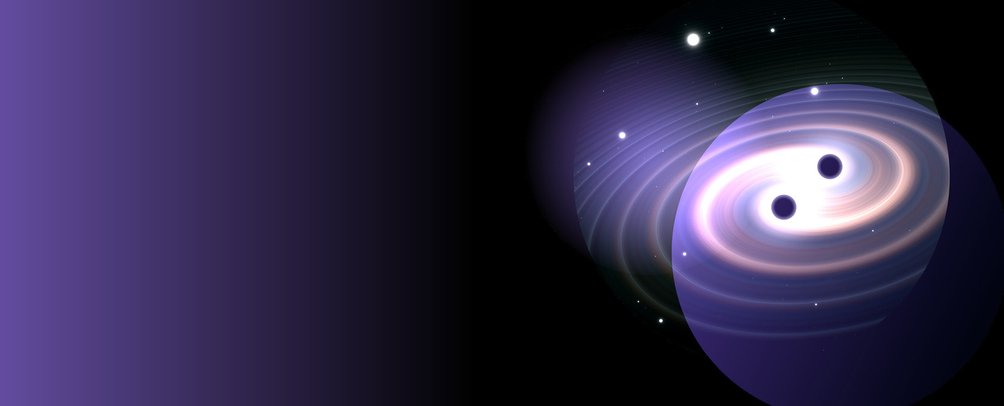
W lutym 2025 roku wydarzyło się coś niezwykłego - pierwszy od 90 lat deszcz meteorytów w Polsce. Zjawisko zarejestrowała sieć kamer Skytinel, dzięki której wyznaczono miejsce spadku i znaleziono kilkadziesiąt fragmentów nowego meteorytu. Nazwano go Drelów - od gminy, w której spadł.
Podczas wykładu poznacie kulisy tego odkrycia oraz tajemnice meteorytów. Szczególnie tych, które spadły na terenie Polski. Dowiecie się, jak rozpoznaje się meteoryty, kto ich szuka i dlaczego, a także jak działa całodobowy monitoring nieba. Na żywo zobaczycie też sam meteoryt Drelów – pierwszy w historii znaleziony dzięki polskim obliczeniom i detekcjom.
A to wszystko z pierwszej ręki. Prelekcję poprowadzi Mateusz Żmija, założyciel sieci Skytinel i wiceprezes Polskiego Towarzystwa Meteorytowego. Nie tylko podzieli się z Wami swoją wiedzą, ale także opowie historie, które pachną przygodą i kosmicznym pyłem.
Mateusz Żmija – założyciel i koordynator sieci Skytinel, wiceprezes Polskiego Towarzystwa Meteorytowego, autor publikacji o obserwowanych spadkach meteorytów (m.in. w Acta Societatis Metheoriticae Polonorum). Z wykształcenia dziennikarz, z zamiłowania – popularyzator, badacz i poszukiwacz.
Astronauci lecący na orbitę okołoziemską muszą sprostać wielu fizycznym wymaganiom. Lot drugiego Polaka w kosmos, dra Sławosza Uznańskiego-Wiśniewskiego, wymagał wielu godzin przygotowań i specjalnych treningów. Jak wyglądają takie treningi? Jakie warunki fizyczne trzeba spełnić, aby polecieć na okołoziemską orbitę? Co może się wydarzyć w kosmosie, jeśli nie zadbamy w pełni o własną kondycję?
Podczas spotkania z cyklu „Prosto z nieba” o treningach astronautów i polskich eksperymentach na orbicie od czasów lotu gen. Mirosława Hermaszewskiego aż po dzisiejszą misję Sławosza Uznańskiego-Wiśniewskiego opowie inżynier kosmiczny Mateusz Harasymczuk, zajmujący się przygotowywaniem treningów astronautów.
Już w tym roku na orbitę okołoziemską poleci – jako drugi Polak w historii – dr Sławosz Uznański-Wiśniewski. Pod koniec zeszłego roku na konferencji w Koperniku zaprezentowana została nazwa jego misji, IGNIS. W jej ramach zaplanowanych jest aż 13 różnych eksperymentów. Będzie to pierwsza polska misja naukowo-technologiczna na Międzynarodową Stację Kosmiczną. W trakcie planowanego dwutygodniowego pobytu na ISS swoje eksperymenty przeprowadzą też inni członkowie 4-osobowej załogi Axiom-4 (gościliśmy u nas trójkę z nich). Start rakiety Falcon 9 odbędzie się z przylądka Canaveral na Florydzie. Na szczycie statku znajdzie się kapsuła Dragon, która dostarczy astronautów na orbitę. Jak będzie przebiegać cała operacja – łącznie z dokowaniem do Międzynarodowej Stacji Kosmicznej – pokażemy na żywo na kopule Planetarium.
Mgr inż. Mateusz Harasymczuk – magister inżynier lotnictwa i astronautyki (Lotnicza Akademia Wojskowa), inżynier oprogramowania i bezpieczeństwa systemów informatycznych. Ukończył studia podyplomowe w zakresie medycyny ekstremalnej, chemii analitycznej, geofizyki stosowanej, kontroli ruchu lotniczego, a także radiobiologii (w belgijskim Centrum Badań Nuklearnych – SCK CEN).
Pilot szybowcowy. Współtworzy ośrodek szkolenia analogowych astronautów w Polsce i habitat AATC. Tworzy system operacyjny HabitatOS jako prototyp dla systemów wykorzystujących uczenie maszynowe dla habitatów na Księżycu i Marsie. W ESA współpracował nad koncepcją Moon Village, projektowaniem habitatów, procedurami Lunar EVA i subiektywną percepcją czasu. Współtworzył dwa prototypy ciśnieniowych skafandrów kosmicznych do eksploracji powierzchni (LEM), dwa skafandry immersyjne i dwa ciśnieniowe skafandry podwodne NBL. Inicjator budowy polskiego systemu habitatów podwodnych oraz podwodnego habitatu w Dubaju.

Co trzeba zrobić, aby polecieć na Międzynarodową Stację Kosmiczną (ISS)? Jak będzie przebiegać misja, w której poleci nasz astronauta Sławosz Uznański-Wiśniewski? Jak wygląda dokowanie do ISS? Jakie badania przeprowadzi polski astronauta? O przygotowaniach do misji, jej przebiegu i szczegółach planowanych eksperymentów opowie podczas spotkania dr Aleksandra Bukała z Polskiej Agencji Kosmicznej.
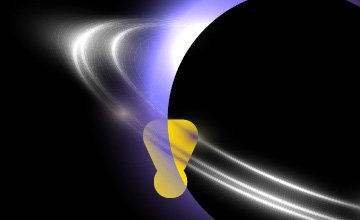
Już pod koniec maja 2025 na orbitę okołoziemską poleci – jako drugi Polak w historii – dr Sławosz Uznański-Wiśniewski. Pod koniec zeszłego roku na konferencji w Koperniku zaprezentowana została nazwa jego misji, IGNIS. W jej ramach zaplanowanych jest aż 13 różnych eksperymentów. Będzie to pierwsza polska misja naukowo-technologiczna na Międzynarodową Stację Kosmiczną. W trakcie planowanego dwutygodniowego pobytu na ISS swoje eksperymenty przeprowadzą też inni członkowie 4-osobowej załogi Axiom-4 (gościliśmy u nas trójkę z nich). Start rakiety Falcon 9 odbędzie się z przylądka Canaveral na Florydzie. Na szczycie statku znajdzie się kapsuła Dragon, która dostarczy astronautów na orbitę. Jak będzie przebiegać cała operacja – łącznie z dokowaniem do Międzynarodowej Stacji Kosmicznej – pokażemy na żywo na kopule Planetarium.
Dr Aleksandra Bukała – Dyrektor Departamentu Strategii i Współpracy Międzynarodowej w Polskiej Agencji Kosmicznej i Kierownik polskiej misji na Międzynarodową Stację Kosmiczną – IGNIS. Absolwentka Szkoły Głównej Handlowej w Warszawie oraz Politechniki Warszawskiej. Posiada ponad 20-letnie doświadczenia w branży wysokich technologii, w tym ponad 15-letnie na stanowiskach kierowniczych. Pracowała w Przemysłowym Instytucie Automatyki i Pomiarów (PIAP), zajmując się robotami mobilnymi na rzecz bezpieczeństwa i obronności. Następnie, przez 8 lat pełniła funkcję Dyrektor Generalnej dwóch wiodących spółek kosmicznych w Polsce w ciekawym okresie narodzin przemysłowego sektora kosmicznego w naszym kraju. Przez 4,5 roku, do czasu przejścia do POLSA, zasiadała w Zarządzie Związku Pracodawców Sektora Kosmicznego. Od wielu lat działa jako ekspertka dla Komisji Europejskiej, Europejskiej Agencji Obrony, NATO i NCBiR. Prywatnie matka dorosłego syna oraz zapalona żeglarka oceaniczna i regatowa.
Zorze polarne już nie kojarzą się wyłącznie z biegunami Ziemi. Latem były widoczne też z Polski i zostały uwiecznione na licznych zdjęciach przez obserwatorów nieba. Urzekają różnorodnością kształtów i kolorów, zależnych od pierwiastków występujących w ziemskiej atmosferze.
Pojawianie się zórz związane jest z aktywnością Słońca. Koronalne wyrzuty masy uwalniają naładowane cząstki, które – o ile dotrą do Ziemi – mogą potencjalnie skutkować burzami geomagnetycznymi i wystąpieniem zorzy. Jak rozbłyski na Słońcu wpływają na naszą planetę? Jak prognozuje się pogodę kosmiczną? Opowie o tym Helena Ciechowska podczas spotkania online.
Helena Ciechowska - od 2020 roku fizyk w Zakładzie Fizyki Plazmy w Centrum Badań Kosmicznych Polskiej Akademii Nauk (CBK PAN). Zajmuje się prognozami pogody kosmicznej oraz obserwacjami jonosfery za pomocą radio teleskopu LOFAR. Absolwentka Wydziału Fizyki Uniwersytetu Warszawskiego oraz doktorantka Szkoły Doktorskiej GeoPlanet w Instytucie Geofizyki PAN.
Rakiety kosmiczne kojarzą się z potężnymi konstrukcjami, których efektowne starty możemy obserwować podczas transmisji NASA. Docierają do Międzynarodowej Stacji Kosmicznej, na Marsa, Księżyc. Takich rakiet nie tworzymy w Polsce. Rodzime zespoły inżynierskie od lat zyskują jednak międzynarodowe uznanie, konstruując rakietowe silniki korekcyjne i hybrydowe, rakiety sondujące i „zielone" alternatywy paliw.
Jak działa silnik rakietowy? Dlaczego tak trudno go zbudować? Nad czym pracują inżynierowie i inżynierki w sieci Badawczej Łukasiewicz – Instytutu Lotnictwa? Jak powstawała rakieta suborbitalna Bursztyn – pierwsza polska rakieta, która przekroczyła linię Kármána, czyli umowną granicę pomiędzy Ziemią a kosmosem? Opowie o tym konstruktor rakiet Damian Kaniewski.
mgr inż. Damian Kaniewski – inżynier konstruktor z 10-letnim doświadczeniem w obszarze technologii rakietowych. Brał udział w licznych pracach badawczo-rozwojowych w ramach programów Europejskiej Agencji Kosmicznej, Narodowego Centrum Badań i Rozwoju oraz projektów statutowych Łukasiewicz – Instytutu Lotnictwa. Jest zaangażowany w program rakiety Bursztyn. Zajmuje się także symulacjami komputerowymi, w tym symulacjami spalania w silnikach rakietowych.
Naukowcy badają kosmos z coraz większymi sukcesami, korzystając z coraz nowocześniejszych technologii, jednak Wszechświat aż w 95% jest dla nas niewidzialny. 68% tej nieznanej części nazywamy ciemną energią, a pozostałych 27% –ciemną materią. Dzięki szeregowi niewyjaśnionych w inny sposób zjawisk wiemy, że one istnieją. Nie mamy jednak pojęcia, czym są.
Projekt CREDO testuje jedną z wielu teorii na temat tego, czym może być ciemna materia – supermasywnymi cząstkami powstałymi we wczesnym Wszechświecie. Aby zidentyfikować roje cząstek o wysokiej energii, potrzebny byłby detektor wielkości Ziemi. Dzięki pomocy ochotników można zastąpić go mnóstwem małych detektorów. Każdy ma taki w swoim smartfonie. Wystarczy pobrać aplikację CREDO Detector i stać się częścią ogólnoświatowej akcji badawczej.
O CREDO opowie prof. dr hab. Robert Kamiński z Instytutu Fizyki Jądrowej PAN w Krakowie. To właśnie pracownicy Instytutu byli inicjatorami projektu.
Prof. dr hab. Robert Kamiński – pracownik Zakładu Teorii Struktury Materii w Instytucie Fizyki Jądrowej Polskiej Akademii Nauk w Krakowie. Analizuje oddziaływania między cząstkami elementarnymi. Zajmuje się też rozwojem projektu CREDO, w tym rejestracją i analizą promieniowania kosmicznego. Popularyzator astrofizyki i fizyki cząstek elementarnych.
Po dniu zawsze przychodzi noc, prawda? Niekoniecznie. Ponad 80% ludzkości żyje pod sztucznie rozświetlonym niebem! Na całym świecie są miejsca, w których prawdziwa noc nie ma szans, by pokazać swoje oblicze. Około 30% mieszkańców Ziemi nie może oglądać Drogi Mlecznej. W Krakowie (przy dobrych warunkach) widać zaledwie 200 gwiazd, podczas gdy w Bieszczadach można ich zobaczyć nawet 7 tysięcy. Za brak naturalnej ciemności odpowiada nadmiar światła, generowanego przez nas samych.
Zanieczyszczenie światłem, tak jak każda inna forma zanieczyszczenia środowiska, ma negatywny wpływ na nasze zdrowie – powoduje zaburzenia snu, zmęczenie wzroku, może nawet przyczyniać się do rozwoju chorób cywilizacyjnych. Brak nocnych ciemności zmienia także cykle dobowe roślin i zwierząt. Wpływa na zwyczaje migracyjne, okresy żerowania.
Jaki jest poziom zanieczyszczenia świetlnego na terenie Polski, a zwłaszcza dużych miast? Czy istnieją rozwiązania, dzięki którym można redukować intensywność oświetlenia, bez konieczności rezygnacji z bezpieczeństwa na ulicach? Na pytania odpowie dr hab. Andrzej Z. Kotarba podczas spotkania Prosto z nieba w Planetarium Centrum Nauki Kopernik.
Dr hab. Andrzej Z. Kotarba – ekspert w dziedzinie satelitarnych obserwacji Ziemi w Centrum Badań Kosmicznych PAN. Najbardziej pasjonują go badania chmur (zwłaszcza za pomocą kosmicznych radarów i laserów) oraz problemy związane z zanieczyszczeniem światłem. Członek grupy eksperckiej Light Pollution Think Tank. Autor kilkudziesięciu publikacji naukowych i kilkuset popularnonaukowych. Fascynuje go poznawanie Ziemi z kosmosu i kosmosu z Ziemi, o czym chętnie opowiada lub pisze – ostatnio na autorskiej stronie www.czarneswiatlo.pl
W ciągu ostatnich 10 lat Polacy wysłali w kosmos aż kilkanaście małych nanosatelitów o łącznej masie około 50 kg. Już w tym roku ta liczba podwoi się wraz z wyniesieniem na orbitę przełomowego satelity EagleEye. To pierwszy, największy z nowej serii polskich satelitów zbudowanych na platformie HyperSat opracowanej przez rodzimych inżynierów.
Satelita obserwacyjny EagleEye zapewni rozdzielczość docelową rzędu 1 m, która osiągnięta zostanie dzięki opracowaniu teleskopu, systemu stabilizacji, umieszczeniu satelity na bardzo niskiej orbicie. Satelita po rozłożeniu paneli na orbicie będzie miał rozmiar 150 cm x 90cm x 54cm i wagę ponad 50 kg.
Jakie wyzwania napotkali twórcy podczas prac nad satelitą? Jakie nowe technologie zastosowali? I co czeka nas dalej? Na te i inne pytania odpowie dr Jakub Bochiński, dyrektor produktów kosmicznych w firmie Creotech Instruments. Na spotkaniu poznacie kulisy powstania tego wyjątkowego projektu i dowiecie się, jakie znaczenie ma on dla polskiej eksploracji kosmosu.
Dr Jakub Bochiński – astronom i odkrywca kilkunastu nowych planet poza Układem Słonecznym. Obecnie, jako Zastępca Dyrektora ds. Produktów Kosmicznych zajmuje się rozwojem technologii kosmicznych w największej polskiej firmie z branży kosmicznej Creotech Instruments S.A. Prowadził również projekty badawczo-rozwojowe mające na celu skonstruowanie nowych misji kosmicznych (m.in. PIAST) oraz innowacyjnych systemów satelitarnych (m.in. napędu rakietowego czy laserowego systemu wykrywania śmieci kosmicznych). Pracował naukowo na University College London oraz Open University w Wielkiej Brytanii, publikując m.in. w Nature i Astrophysical Journal. W Polsce zarządzał zespołami B+R w Centrum Nauki Kopernik i Sollers Consulting. Doradzał Europejskiej Agencji Kosmicznej jako członek komitetu ds. edukacji, Polskiej Agencji Kosmicznej jako członek panelu naukowego oraz Komisji Europejskiej jako członek zespołu ekspertów ds. komunikacji naukowej. Współtworzył międzynarodową Fundację Polonium specjalizującą się w sieciowaniu polskiej diaspory naukowej na całym świecie oraz Stowarzyszenie Rzecznicy Nauki uhonorowane w 2019 roku tytułem najlepszej instytucji popularyzującej naukę w Polsce. Obecnie prowadzi autorski program nauczania STEM w Akademeia Educational Group. Jako mówca publiczny przeprowadził ponad dwieście wykładów i warsztatów, m.in. w ramach Adamed SmartUP, infoShare, TEDx, Women in Tech Summit czy BBC Stargazing Live.
Bez nawigacji w smartfonie czy smartwatchu wiele osób nie wyobraża już sobie życia. Aplikacje kierują naszymi krokami po drogach i szlakach, czasami domagają się dostępu do naszej lokalizacji by podpowiadać nam wydarzenia, a innym razem na jej podstawie wiedzą, czy jesteśmy już w pracy czy jeszcze w domu.
Ale czy wiemy co tak naprawdę kieruje naszymi krokami? Czy wiemy jakie są systemy nawigacji satelitarnej? Jak są zbudowane, jakie zasady rządzą wyznaczaniem naszej pozycji?
A może systemy te możemy wykorzystać do innych celów?
Dr Anna Świątek – pracuje w Centrum Badań Kosmicznych PAN, obecnie na stanowisku adiunkta, pełni funkcję kierownika Laboratorium GNSS („Global Navigation Satellite System”) oraz jest redaktorem zarządzającym czasopisma naukowego Artificial Satellites, Journal of Planetary Geodesy.
Od początku swojej pracy naukowej zajmuje się wykorzystaniem technik GNSS najpierw w pracach geodezyjnych (za które zespół został wyróżniony Nagrodą Ministra Infrastruktury za wprowadzenie w Polsce jednolitego geodezyjnego układu odniesienia EUREF-89), z czasem w zastosowaniach w geofizyce satelitarnej przy badaniu i modelowaniu jonosfery, obecnie zaangażowana w prace dotyczące monitorowania i analiz systemu wspomagania wyznaczania pozycji EGNOS oraz europejskiego systemu nawigacji satelitarnej Galileo.
Z centrów niektórych galaktyk, w których znajdują się supermasywne czarne dziury, wyrzucane są strugi materii poruszające się z wielkimi prędkościami. Nazywamy je relatywistycznymi dżetami. Najbardziej znane pochodzą z okolic czarnej dziury w centrum wielkiej galaktyki eliptycznej M87. To ta sama czarna dziura, której słynne zdjęcie, wykonane przy pomocy Teleskopu Horyzontu Zdarzeń, oglądaliśmy w 2019 roku, a 22 stycznia 2024 roku zobaczyliśmy jego nową wersję, ocenioną jako najlepszą w historii.
Galaktyka M87 znajduje się w gwiazdozbiorze Panny, w odległości około 53 milionów lat świetlnych od Ziemi. Podczas wykładu zastanowimy się nad mechanizmem powstawania dżetów, dzięki któremu część materii może uniknąć wchłonięcia przez czarną dziurę, a także przyjrzymy się badaniom obrazu czarnej dziury i jej bezpośredniego otoczenia.
Dr hab. Krzysztof Nalewajko – profesor instytutu w Centrum Astronomicznym im. Mikołaja Kopernika (CAMK) w Warszawie. Studiował astronomię na Uniwersytecie Warszawskim. Studia doktoranckie odbył w CAMK. Pracował w Joint Institute for Laboratory Astrophysics (JILA) Uniwersytetu w Kolorado w Boulder. W 2013 r. otrzymał prestiżowe stypendium NASA Einstein Postdoctoral Fellowship w celu realizacji projektu „Understanding Gamma-Ray Flares of Blazars”, wspierającego misję kosmicznego teleskopu gamma „Fermi”. Jest autorem ponad 80 prac naukowych z astrofizyki.
Gdyby Słońce zgasło, Ziemia przestałaby być zieloną planetą. Przez jakiś czas żylibyśmy w ciemności i zimnie, dopóki nie zginęłyby wszystkie rośliny i zwierzęta. Nasza dzienna gwiazda to podstawowy dostawca życiodajnej energii i jesteśmy od niej zależni bardziej, niż nam się wydaje. Aktywność słoneczna – rozbłyski i często związane z nimi koronalne wyrzuty masy – wywiera wpływ na ziemską magnetosferę i naszą infrastrukturę techniczną. Co to oznacza w praktyce? Czego możemy się spodziewać w przyszłości? Opowie o tym heliofizyk, dr Marek Stęślicki.
dr Marek Stęślicki - heliofizyk, specjalista w Zakładzie Fizyki Słońca Centrum Badań Kosmicznych PAN. Zajmuje się badaniami zjawisk aktywnych na Słońcu. Stopień doktora nauk fizycznych uzyskał w 2008 roku w Instytucie Astronomicznym Uniwersytetu Wrocławskiego, gdzie był adiunktem do roku 2012. W latach 2011- 2012 pracował w High Altitude Observatory National Center of Atmospheric Research w Boulder, Kolorado. Członek międzynarodowych zespołów naukowych i konstrukcyjnych dla instrumentów STIX na pokładzie Solar Orbitera (ESA), ASPIICS na misji Proba-3 (ESA) oraz misji CubIXSS (NASA).
„Pierwszy rok rewolucji Teleskopu Kosmicznego Jamesa Webba – od planet pozasłonecznych po początki Wszechświata.”
Już od ponad roku teleskop kosmiczny Jamesa Webba (JWST) przesyła astronomom spektakularne zdjęcia kosmosu. Jaki obraz się z nich wyłania? Czego dowiedzieliśmy się o powstających gwiazdach i planetach? Czy obserwowane zjawiska łamią zasady współczesnej fizyki? Na te i inne pytania odpowie kolejny gość naszego cyklu, astrofizyk Łukasz Tychoniec, zgłębiając naukę, jaka kryje się za niesamowitymi obserwacjami tego wartego ponad 10 miliardów dolarów teleskopu.
Dr Łukasz Tychoniec – astrofizyk z Uniwersytetu w Leiden w Holandii. Zajmuje się tematyką powstawania gwiazd i planet oraz astrochemią. Ekspert w obserwacjach podczerwonych i radiowych przy użyciu teleskopu kosmicznego Jamesa Webba oraz sieci radioteleskopów ALMA.
Gigantyczne czarne dziury wiążą grawitacyjnie galaktyki i bezpośrednio wpływają na ich życie. W roku 2020 Nagroda Nobla z dziedziny fizyki trafiła do trojga astrofizyków badających supermasywne czarne dziury, które niemal na pewno znajdują się w centralnych obszarach każdej z galaktyk. Jak naukowcy obecnie postrzegają te monstrualnie, a jednocześnie trudne do obserwacji obiekty? W jaki sposób można je badać i odkrywać w pobliskim Wszechświecie? Prof. Agata Różańska opowie o tworzeniu obserwatoriów satelitarnych na przekładzie dwóch flagowych misji Europejskiej Agencji Kosmicznej: New-ATHENA oraz eLISA.
Prof. Agata Różańska pracuje w Centrum Astronomicznym Mikołaja Kopernika PAN. Jej głównym zainteresowaniem naukowym jest numeryczne modelowanie emisji promieniowania z atmosfer dysków akrecyjnych w aktywnych jądrach galaktyk i rentgenowskich układach podwójnych. Ponadto pozyskuje i opracowuje dane rentgenowskie z największych działających teleskopów satelitarnych: Chandra, XMM-Newton, SUZAKU i NuSTAR. Od roku 2014 koordynuje prace polskich naukowców i inżynierów przy budowie elementów satelitarnych nowego teleskopu ATHENA. Kieruje projektem badawczym „Rentgenowskie linie papilarne akreujących obiektów zwartych”, finansowanym przez Narodowe Centrum Nauki.
Wiadomość z ostatniej chwili: ktoś wymazał treść wszystkich map w atlasach! Holmes, Monk i Columbo jednoczą siły, by odkryć sprawców, niemniej śledztwo potrwa jeszcze kilka tygodni... Tymczasem życie toczy się dalej – niestety, w coraz większym chaosie. Bez map jesteśmy jak dzieci we mgle. Trzeba błyskawicznie zapisać je na nowo. Wzywamy pomoc, ale Batman, Iron Man, Wonder Woman i Superman nie dają rady. Niestety, Chuck Norris też. Pora zatem na prawdziwych superbohaterów. Przybywają prosto z kosmosu! Całą drużyną. W lśniących, aluminiowych zbrojach. Każdy ma inną supermoc. Kim są? Czy zdołają odtworzyć atlasy? Jak szybko? Jak szczegółowo? I ile sobie za to policzą?
Copernicus to europejski satelitarny program obserwacji Ziemi, zarządzany i koordynowany przez Komisję Europejską. Jest realizowany we współpracy z państwami członkowskim UE i Europejską Agencją Kosmiczną, dostarczając istotnych informacji nt. naszej planety i jej środowiska. Globalne dane satelitarne w połączeniu z danymi z powietrznych, naziemnych i morskich systemów pomiaru dostarczane są m.in. dla usługodawców i organów publicznych dla podejmowania działań służących podnoszeniu jakości życia mieszkańców.
Spotkanie z członkami Polskiego Towarzystwa Miłośników Astronomii
Na godzinę przed wykładem wewnątrz Planetarium na wystawie "Patrz: Ziemia" (wstęp bezpłatny), do dyspozycji będą członkowie Polskiego Towarzystwa Miłośników Astronomii, z którymi będzie można porozmawiać o obserwacjach nieba. Dodatkowo po wykładzie, jeśli dopisze pogoda, od godz. 21:30 przed Planetarium można będzie razem z nimi obserwować na niebie planety Wenus i Mars.
Prowadzący wykład:
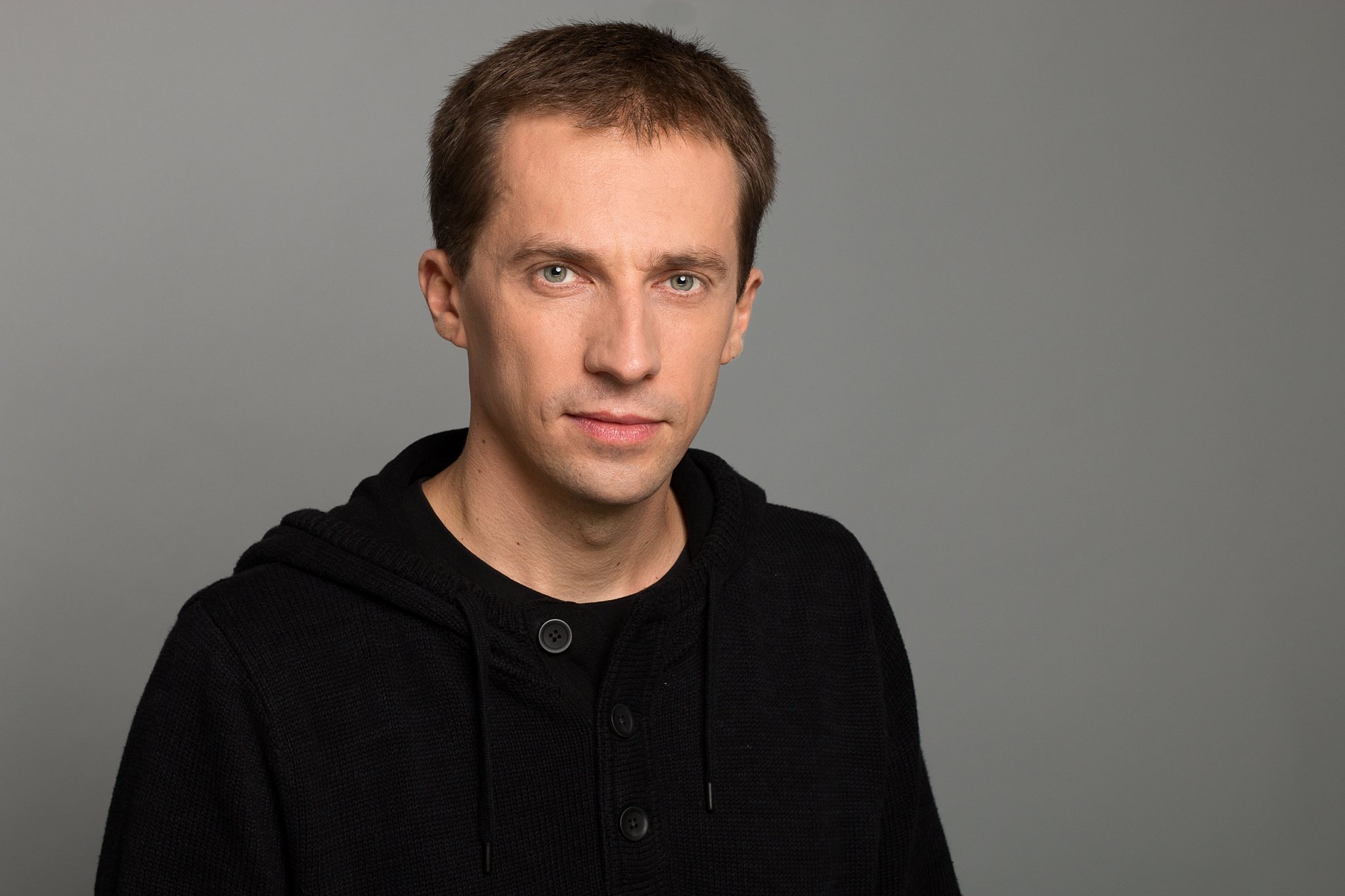
Dr hab. Andrzej Z. Kotarba – naukowiec z Centrum Badań Kosmicznych PAN, ekspert w tematyce satelitarnych obserwacji Ziemi. Najbardziej pasjonują go badania chmur (zwłaszcza za pomocą kosmicznych radarów i laserów) oraz problemy związane z zanieczyszczeniem światłem. Członek grupy eksperckiej Light Pollution Think Tank, Autor kilkudziesięciu publikacji naukowych i kilkuset popularnonaukowych. Fascynuje go poznawanie Ziemi z kosmosu i kosmosu z Ziemi, o czym chętnie opowiada lub pisze – ostatnio na autorskiej stronie www.czarneswiatlo.pl
Dlaczego znów wybieramy się do tajemniczego świata Jowisza i jego księżyców? W kwietniu tego roku swoją podróż rozpoczęła sonda kosmiczna JUICE (ESA), a w przyszłym wystartuje sonda Europa Clipper (NASA). Co wiemy o tej odległej planecie i jej naturalnych satelitach? Czego chcemy się dowiedzieć? Jak wyglądają prace nad stworzeniem sondy kosmicznej i wreszcie same badania? Na te pytania odpowie podczas najbliższego spotkania w Planetarium dr Tomasz Barciński z Centrum Badań Kosmicznych PAN.
Dr Tomasz Barciński – kierownik Laboratorium Mechatroniki i Robotyki Satelitarnej w Centrum Badań Kosmicznych PAN. Specjalizuje się w teorii sterowania i mechatronice. Kieruje zespołami inżynierskimi pracującymi nad najważniejszymi misjami kosmicznymi z udziałem Polski, w tym nad budową podróżującej właśnie do Jowisza sondy JUICE, europejskiego kosmicznego teleskopu rentgenowskiego ATHENA czy sondy Comet Interceptor mającej przechwycić kometę spoza Układu Słonecznego. Zaangażowany jest również w projekt kosmicznej śmieciarki w programie ESA ClearSpace oraz polskiego satelity obserwacyjnego Eagle Eye.
To, że rozszerzanie Wszechświata przyspiesza, jest jednym z najważniejszych odkryć naukowych ostatniego ćwierćwiecza. Za przyspieszeniem tym stoi najprawdopodobniej ciemna energia. Podczas najbliższego wykładu z cyklu „Prosto z nieba” wybitny fizyk Bharat Ratra przywoła dane astronomiczne wskazujące na to, że obecnie kosmos składa się głównie z tajemniczych, niewykrytych do dzisiaj składników – ciemnej energii i ciemnej materii. Naukowiec opowie też, w jaki sposób współczesne obserwacje doprowadziły do opracowania „standardowego” modelu opisującego ewolucję Wszechświata od narodzin aż do dziś.
 Bharat Ratra – wybitny profesor fizyki, specjalizujący się w kosmologii i fizyce astrocząstek. Prowadzi badania nad strukturą i ewolucją Wszechświata. Obecnie koncentruje się przede wszystkim na opracowywaniu modeli wielkoskalowych rozkładów materii i promieniowania we Wszechświecie oraz testowaniu tych modeli poprzez porównywanie przewidywań z danymi obserwacyjnymi. W 1988 roku, wraz z Jamesem Peeblesem, zaproponował pierwszy dynamiczny model ciemnej energii.
Bharat Ratra – wybitny profesor fizyki, specjalizujący się w kosmologii i fizyce astrocząstek. Prowadzi badania nad strukturą i ewolucją Wszechświata. Obecnie koncentruje się przede wszystkim na opracowywaniu modeli wielkoskalowych rozkładów materii i promieniowania we Wszechświecie oraz testowaniu tych modeli poprzez porównywanie przewidywań z danymi obserwacyjnymi. W 1988 roku, wraz z Jamesem Peeblesem, zaproponował pierwszy dynamiczny model ciemnej energii.
Tytuł magistra prof. Ratra obronił w Indian Institute of Technology w New Delhi, a doktorat z fizyki uzyskał na Uniwersytecie Stanforda. Staż podoktorski odbył na Uniwersytecie Princeton, w California Institute of Technology oraz Massachusetts Institute of Technology. Jest członkiem Amerykańskiego Towarzystwa Fizycznego (od 2002), Amerykańskiego Towarzystwa Postępu Naukowego (od 2005) oraz Amerykańskiego Towarzystwa Astronomicznego (od 2023), a także członkiem-założycielem North Central Kansas Astronomical Society oraz Center for the Understanding of Origins na Uniwersytecie Stanowym w Kansas. Aktywnie angażuje się w różne działania naukowe (w tym w program National Science Foundation QuarkNet dla nauczycieli przedmiotów ścisłych w szkołach średnich m.in. w Kansas) oraz informacyjne skierowane do nauczycieli przedmiotów ścisłych, a także do całych szkół podstawowych, gimnazjów i liceów. Laureat nagród: National Science Foundation CAREER (1999), Commerce Bank Distinguished Graduate Faculty Award na Uniwersytecie Stanowym w Kansas (20212–2013), Olin Petefish Award in Basic Sciences (2017) oraz Kansas Science Communication Initiative – Science Communication Award (2020). Na koncie ma 140 publikacji naukowych, cytowanych w literaturze naukowej ponad 19 tys. razy, a także liczne wystąpienia na konferencjach i warsztatach oraz na forum krajowych laboratoriów, instytucji akademickich i publicznych na całym świecie.
Dzięki rozwojowi technologicznemu, w ciągu ostatnich dekad oglądamy niebo znacznie dokładniej. Do poszukiwania obiektów w Układzie Słonecznym wykorzystuje się zaawansowane kamery fotograficzne oraz algorytmy, pozwalające na automatyczną detekcję planetoid i komet. Nie znaczy to jednak, że porzucone zostały klasyczne metody ich odkrywania. Astronomowie – amatorzy wciąż z nich z powodzeniem korzystają. Podczas wykładu z cyklu „Prosto z nieba” łowca komet i planetoid Michał Kusiak opowiedział, jak poszukiwać małych obiektów niebieskich, kiedy dysponuje się teleskopem i aparatem cyfrowym. Zaprezentował także kilka metod i podzielił się wskazówkami, które mogą usprawnić poszukiwania i skrócić drogę do sukcesu.
Michał Kusiak – łowca komet i planetoid, odkrywca 170 komet muskających Słońce na zdjęciach z sondy SOHO i STEREO. Współodkrywca komety C/2015 F2 Polonia i wielu planetoid (lata 2012-2017), z których 23 obiekty dostały swoje numery katalogowe i zostały nazwane. Jedna z planetoid nosi jego imię i nazwisko. Popularyzator astronomii, finalista Plebiscytu Popularyzator Nauki w 2015 r.
W ostatnich latach coraz częściej jesteśmy świadkami ekstremalnych zjawisk pogodowych, za które w ogromnej mierze odpowiada zmiana klimatu wywołana przez działalność człowieka. W różnych miejscach globu mamy więc do czynienia z coraz intensywniejszymi falami upałów, coraz częstszymi suszami, a także ulewnymi deszczami, powodziami, wichurami i huraganami. Podczas wykładu profesor Nauk o Ziemi Joanna Wibig opowie m.in. o tym:
Joanna Wibig – fizyk atmosfery, profesor Nauk o Ziemi. Ukończyła fizykę na Wydziale Fizyki Uniwersytetu Warszawskiego, po czy związała się z Uniwersytetem Łódzkim. Obecnie kieruje Zakładem Meteorologii i Klimatologii na Wydziale Nauk Geograficznych Uniwersytetu Łódzkiego. Jej zainteresowania naukowe obejmują współczesne (okres instrumentalny) zmiany klimatu, ich detekcję i atrybucję czynników zmian, wpływ cyrkulacji atmosferycznej na przebieg pogody na obszarze Europy, projekcje klimatyczne na XXI wiek dla Europy Środkowej na podstawie symulacji regionalnych modeli klimatu oraz ekstremalne zdarzenia pogodowe w przeszłości i ich projekcje na XXI wiek. Koordynowała realizacją ponad 10 grantów naukowych finansowanych przez Komitet Badań Naukowych, Ministerstwo Nauki i Szkolnictwa Wyższego (dzisiaj MEiN) oraz Narodowe Centrum Nauki, a także jednego grantu w ramach Szóstego Programu Ramowego Unii Europejskiej. Była recenzentką kilku raportów Międzyrządowego Zespołu ds. Zmian Klimatu (IPCC). Jej wielokrotnie cytowany dorobek obejmuje blisko 150 publikacji. Jest współautorką dwóch raportów podsumowujących zmiany klimatu w regionie Bałtyku (Baltic Assessment of Climate Change) i monografii o zmianach klimatu w Polsce (Climate Change in Poland).
Mikołaj Kopernik (1473–1543) pchnął badania Wszechświata na nowe tory, przedstawiając w swoim dziele De revolutionibus (O obrotach) heliocentryczny model naszego systemu planetarnego. Posłużył się w tym celu wyrafinowanym językiem geometrii. Tworząc astronomię heliocentryczną, Kopernik wykorzystał obserwacje swoich wielkich poprzedników, w tym Klaudiusza Ptolemeusza i astronomów islamu. Dzięki obserwacjom ciał niebieskich, które sam również prowadził przez całe swoje dorosłe życie, stworzył zupełnie nową astronomię. Kim zatem był Kopernik-astronom? Obserwatorem? Teoretykiem? I dlaczego zdecydował się na odrzucenie geocentrycznego modelu kosmosu, czyniąc z Ziemi jedną z planet obiegających Słońce?
 Prof. Jarosław Włodarczyk
Prof. Jarosław Włodarczyk
Historyk astronomii, profesor zwyczajny w Instytucie Historii Nauki PAN w Warszawie. Członek towarzystw naukowych polskich i zagranicznych, w tym Polskiej Akademii Nauk, Towarzystwa Naukowego Warszawskiego i Académie internationale d’histoire des sciences. Autor książek: Wędrówki niebieskie, czyli Wszechświat nie tylko dla poetów, Historia naturalna gwiazdozbiorów (wraz z Jerzym Dobrzyckim), Tajemnica Gwiazdy Betlejemskiej, Astrologia. Historia, mity, tajemnice oraz Księżyc w nauce i kulturze Zachodu. Redaktor naczelny serii naukowych „Studia Copernicana” i „Bibliotheca Heveliana”. W 1995 r. „za popularyzację wiedzy o Wszechświecie” otrzymał Medal im. prof. Włodzimierza Zonna przyznawany przez Polskie Towarzystwo Astronomiczne, a w 2016 r. Złoty Medal Fromborski od Warmińskiej Kapituły Katedralnej i Akademii Humanistycznej im. Aleksandra Gieysztora za wstęp i komentarz krytyczny do książki Jerzego Joachima Retyka Relacja pierwsza z ksiąg O obrotach Mikołaja Kopernika.
Bazy kosmiczne, stacje górnicze, elektrownie orbitalne. To nie film science fiction, to część realizowanych obecnie programów wielu agencji kosmicznych. Jak będzie wyglądać ten nowy rozdział eksploracji kosmosu? Jakie zasoby uda nam się pozyskać i wykorzystać jako pierwsze? Odpowiedzi udzieli doktor Gordon Wasilewski, górnik kosmiczny, absolwent Akademii Górniczo-Hutniczej w Krakowie. Jest starszym inżynierem ds. badań i rozwoju w spółce Astronika, w której prowadzi projekty dla Europejskiej Agencji Kosmicznej. Obronił doktorat w Centrum Badań Kosmicznych PAN we współpracy z Colorado School of Mines. Jego praca dotyczyła wydobycia wody poza Ziemią.
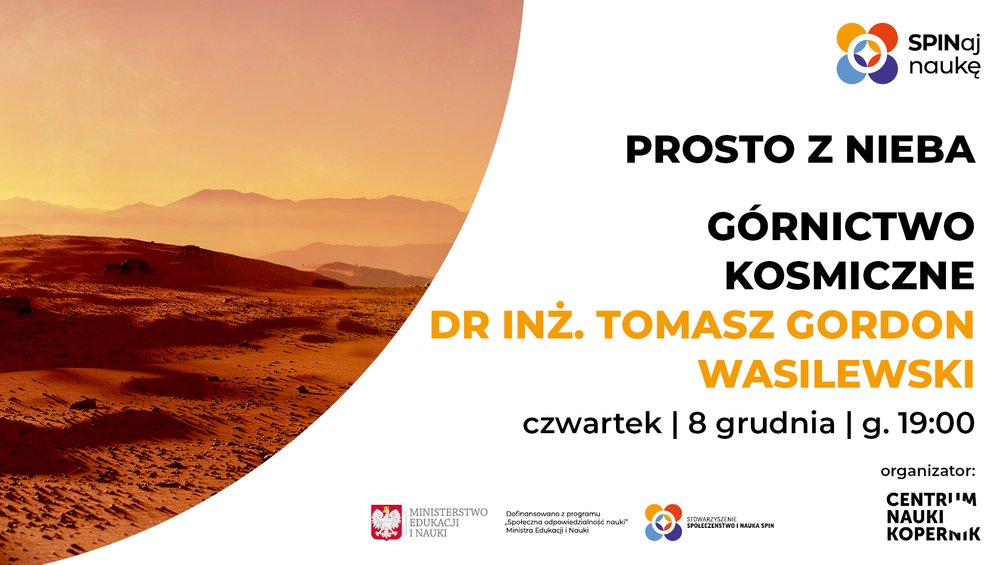
Dofinansowano z programu „Społeczna odpowiedzialność nauki” Ministra Edukacji i Nauki.

Co doprowadziło do powstania pierwszych kontynentów na młodej jeszcze Ziemi? Kiedy w atmosferze pojawił się tlen? Jak doszło do wielkiej eksplozji życia ok. pół miliarda lat temu i jak wyglądali pierwsi mieszkańcy naszej planety? Odpowiedzi na te pytania poszukamy podczas najbliższego spotkania „Prosto z nieba”.
Naszym gościem będzie dr hab. Anna Żylińska z Wydziału Geologii Uniwersytetu Warszawskiego, która specjalizuje się w trylobitach – skamieniałościach wymarłych morskich bezkręgowców. Wykorzystuje je do względnego datowania skał i rekonstrukcji paleogeograficznych. Interesuje się także zespołami organizmów, jakie pojawiły się w zapisie kopalnym ok. pół miliarda lat temu podczas kambryjskiej eksplozji życia.
Bezpośrednie detekcje fal grawitacyjnych – efektu przewidzianego przez ogólną teorią względności – otwierają zupełnie nowe możliwości obserwacyjne Wszechświata i obiecują postęp w eksperymentalnym weryfikowaniu teorii grawitacji, teorii populacji gwiazd, materii jądrowej i kosmologii. Podczas najbliższego spotkania z cyklu „Prosto z nieba” astrofizyk Michał Bejger opowie o idei detekcji fal, o najczulszych obecnie urządzeniach zdolnych wykrywać fale grawitacyjne (laserowych interferometrach LIGO i Virgo), o planach na przyszłość, a przede wszystkim o detekcjach astrofizycznych źródeł fal grawitacyjnych, których do tej pory zarejestrowaliśmy już blisko 100.
Dofinansowano z programu „Społeczna odpowiedzialność nauki” Ministra Edukacji i Nauki.

Prof. dr hab. Grzegorz Wrochna
Kosmos kojarzy się z rozgwieżdżonym niebem, wyprawami na inne planety i literaturą science-fiction. Tymczasem jest on dziś miejscem ożywionej działalności gospodarczej i wszyscy korzystamy z technologii kosmicznych, często zupełnie nieświadomie. Jakie miejsce w kosmosie zajmuje Polska? Jakie mamy ambicje i plany? Odpowiedzi na te pytania udzieli Grzegorz Wrochna – prezes Polskiej Agencji Kosmicznej.
Warto przyjść wcześniej, by zwiedzić w Planetarium bezpłatną wystawę „Patrz: Ziemia” z niezwykłymi zdjęciami lądów i mórz widzianych z orbity. A jeśli dopisze pogoda, przed wykładem będzie też można popatrzeć na Słońce przez specjalny teleskop słoneczny. Znajdziecie nas na bulwarach przed budynkiem Planetarium w godz. 18.00–18.50. Razem sprawdzimy, czy Słońce ma plamy, a może zobaczymy inne przejawy aktywności naszej gwiazdy.
 Grzegorz Wrochna
Grzegorz Wrochna
Prof. nauk fizycznych, prezes Polskiej Agencji Kosmicznej. Pracował na Wydziale Fizyki UW, współpracował z ośrodkami naukowymi DESY w Hamburgu i CERN w Genewie, gdzie uczestniczył w projektowaniu i budowie eksperymentu CMS przy Wielkim Zderzaczu Hadronów LHC. Był inicjatorem utworzenia Narodowego Centrum Badań Jądrowych w 2011 r. i jego dyrektorem do 2015 r. Reprezentował Polskę w komitetach programowych EURATOM, komitetach Nuclear Energy Agency OECD, Radzie Nadzorczej unijnego Joint Research Centre. W Ministerstwie Nauki i Szkolnictwa Wyższego nadzorował współpracę z Komisją Europejską i ESA.
Dofinansowano z programu „Społeczna odpowiedzialność nauki” Ministra Edukacji i Nauki.

Prof. Mirosław Darecki, Instytut Oceanologii PAN
Nie tylko fascynacja i ciekawość od niepamiętnych czasów popychała ludy żyjące w rejonach nadmorskich do poznawania i badania mórz i oceanów oraz tego, co się w nich kryje. Wymuszała to na nich także zależność ekonomiczna od morza. Jednak dopiero od niewiele ponad czterdziestu lat ludzkość dysponuje narzędziami pozwalającymi jej na prowadzenie obserwacji i badań mórz z orbit satelitów okołoziemskich. Daje jej to zupełnie nowy obraz morskiego środowiska. Badania te potwierdziły, w jak wielkim stopniu morza i oceany wpływają na klimat Ziemi i warunki, w jakich żyjemy – i to nie tylko na obszarach położonych blisko morza.
Na najbliższym spotkaniu „Prosto z nieba” dowiemy się, jak takie badania się prowadzi, co tak naprawdę widać z kosmosu, gdy patrzy się na nasze morza i oceany, a także jakich informacji dostarczają naukowcom te obserwacje. Przekonamy się też, jak bardzo są one ważne w kontekście zmian klimatycznych coraz bardziej postępujących na naszej planecie. Posłuchamy też o tym, jak działa system obserwacji satelitarnych Bałtyku oraz jak ciekawe i użyteczne – nawet dla nienaukowców – informacje o środowisku naszego morza możemy z niego uzyskać.
Mirosław Darecki – profesor w Instytucie Oceanologii Polskiej Akademii Nauk, kierownik Zakładu Fizyki Morza i Pracowni Teledetekcji Morza. Pracował naukowo również na Uniwersytecie w Southampton (Wielka Brytania) i Scripps Institution of Oceanography w Sand Diego (USA). Realizował projekty dla agencji kosmicznych NASA i ESA w zakresie badań satelitarnych mórz i oceanów. Zajmuje się głównie optycznymi badaniami mórz i oceanów, w tym teledetekcją satelitarną koloru morza. Interesują go interakcje światła z różnymi komponentami wody morskiej, to, jak światło rozprzestrzenia się w toni wodnej oraz jaki ma to wpływ na funkcjonowanie różnych elementów ekosystemów morskich, w tym na fotosyntezę materii organicznej w toni wodnej.
Dofinansowano z programu „Społeczna odpowiedzialność nauki” Ministra Edukacji i Nauki.

Dr Joanna Drążkowska z Obserwatorium Uniwersytetu Ludwika i Maksymiliana w Monachium
Gdzie my właściwie żyjemy? Skąd się wzięła Ziemia? Czym właściwie jest? Przez setki tysięcy lat ludzie nie znali odpowiedzi na te pytania. To nie znaczy, że tych pytań sobie nie zadawali. Jednak dopiero od stu lat ludzkość zna prawdziwy wiek Ziemi i Układu Słonecznego. Teoria o jego pochodzeniu powstawała przez ostanie pięćdziesiąt lat!
Co o Układzie Słonecznym wiadomo dzisiaj. Jak na rozwój badań wpłynęło odkrycie planet pozasłonecznych. O tym porozmawiamy na najbliższym spotkaniu z cyklu „Prosto z nieba”.
Doktor Joanna Drążkowska pracuje w Obserwatorium Uniwersytetu Ludwika i Maksymiliana w Monachium. Studia astronomiczne ukończyła na Uniwersytecie Mikołaja Kopernika w Toruniu, tytuł doktora otrzymała na Uniwersytecie w Heidelbergu, staż podoktorski odbyła na Uniwersytecie w Zurychu. Zajmuje się teorią powstawania układów planetarnych. Jest laureatką Nagrody Młodych Polskiego Towarzystwa Astronomicznego i Early Career Award czasopisma „Astronomy & Astrophysics”.
Dofinansowano z programu „Społeczna odpowiedzialność nauki” Ministra Edukacji i Nauki.

Prof. Agnieszka Janiuk, Centrum Fizyki Teoretycznej PAN
Od lat 60. XX wieku satelity umieszczone na orbicie okołoziemskiej rejestrują rozbłyski energii w zakresie promieniowania gamma. Początkowo, w okresie tzw. zimnej wojny, sądzono, że są to przejawy ludzkiej, wrogiej działalności. Szybko okazało się jednak, że zaobserwowane rozbłyski pochodzą z kosmosu, a nawet z najdalszych jego zakątków. Badając ich własności za pomocą obserwacji satelitarnych i naziemnych, mogliśmy dowiedzieć się, że ich pochodzenie wiąże się z kosmicznymi katastrofami. Ostatnio nowych fascynujących informacji dostarczyły nam detektory fal grawitacyjnych. O badaniach nad rozbłyskami gamma oraz teoriach na temat ich pochodzenia opowie prof. Agnieszka Janiuk.
Dofinansowano z programu „Społeczna odpowiedzialność nauki” Ministra Edukacji i Nauki.

Prof. dr hab. Łukasz Wyrzykowski, Obserwatorium Astronomiczne Uniwersytetu Warszawskiego
Wiemy, że nasza Galaktyka ma w swoim centrum supermasywną czarną dziurę. Powinna zawierać również setki milionów mniejszych czarnych dziur, powstałych m.in. po wymarłych gwiazdach. Tymczasem znamy ich zaledwie kilkadziesiąt. Gdzie „schowała się” cała reszta?
Poszukuje ich misja kosmiczna Europejskiej Agencji Kosmicznej Gaia, wystrzelona w 2013 roku. Jest ona w stanie wykryć subtelne przesunięcia w położeniach gwiazd wywołane przez efekt soczewkowania grawitacyjnego. Dzięki niej wkrótce będziemy w stanie wykrywać pojedyncze czarne dziury w Galaktyce, co pozwoli na rozwiązanie zagadki ciemnej materii i „ukrytych” czarnych dziur. O dotychczasowych osiągnięciach i planach misji Gaia opowie prof. Łukasz Wyrzykowski.
Dofinansowano z programu „Społeczna odpowiedzialność nauki” Ministra Edukacji i Nauki.

Mateusz Harasymczuk, Natalia Zalewska
Mars czy Księżyc? Podczas grudniowego spotkania „Prosto z nieba” zastanowimy się nad kierunkami eksploracji kosmosu. Jakie korzyści mogą płynąć z powrotu ludzi na Księżyc? A może lepiej skupić się na przygotowaniu pierwszej załogowej misji na Marsa? O atutach, niespodziankach i trudnościach, które potencjalnie mogą czekać na tych ciałach niebieskich opowiedzą Mateusz Harasymczuk i Natalia Zalewska.
Dofinansowano z programu „Społeczna odpowiedzialność nauki” Ministra Edukacji i Nauki.

Niektórym kometom obieg wokół Słońca zajmuje setki tysięcy, a nawet miliony lat! To one będą bohaterkami naszej opowieści. Większość takich komet przybywa z peryferii Układu Słonecznego, z miejsca zwanego Obłokiem Oorta.
Badacze uważają, że to waśnie tam znajduje się cała chmura tych fascynujących obiektów. Co roku odkrywa się ich od kilku do kilkunastu. Dr hab. Małgorzata Królikowska – Sołtan pomoże nam przyjrzeć się bliżej Obłokowi Oorta i opowie o badaniach ich ścieżek, które jesteśmy w stanie precyzyjnie zarejestrować na niebie.
Wykład odbywa się wyłącznie stacjonarnie, pod kopułą Planetarium.
Dofinansowano z programu „Społeczna odpowiedzialność nauki” Ministra Edukacji i Nauki.

Jakie są podstawowe mechanizmy rządzące klimatem? Co kryje się pod pojęciem bilansu energetycznego planety? Czym są wymuszenia i sprzężenia w systemie klimatycznym? Czy czekają nas nieodwracalne zmiany?
Odpowiedzi na te i inne pytania związane z kryzysem klimatycznym poznacie już niebawem w Planetarium, podczas wykładu prof. Szymona Malinowskiego. Zarówno wymuszenia, jak i sprzężenia są groźne dla klimatu, a przekroczenie punktów krytycznych w systemie klimatycznym powoduje szybkie i daleko idące zmiany w ich działaniu. Przekonacie się, że aktualnie największym oddziałującym na system klimatyczny – podobnie jak na cały ekosystem ziemski – wymuszeniem jest działalność człowieka. Podczas spotkania wspólnie zastanowimy się też, co zrobić, żeby nasze antropogeniczne wymuszenia nie spowodowały rychłej i głębokiej destabilizacji tych systemów, która skutkować może kryzysem planetarnym.
Dofinansowano z programu „Społeczna odpowiedzialność nauki” Ministra Edukacji i Nauki.

Zapraszamy Was na bezpieczne i kontrolowane spotkanie z planetoidami! Te niewielkie ciała niebieskie (o rozmiarach od metra do kilkuset kilometrów) obiegają Słońce podobnie jak planety. Mogą jednak przecinać sobie drogę i zderzyć się z innymi obiektami. Ślady takich kosmicznych katastrof widoczne są na powierzchniach Księżyca i Merkurego, a część zderzeń odcisnęła nawet swoje piętno na ewolucji życia na Ziemi.
O zagrożeniach ze strony planetoid i ewolucji Układu Słonecznego opowie dr Ryszard Gabryszewski - astronom, doktor nauk fizycznych w dziedzinie geofizyki. Pracuje w Zakładzie Dynamiki Układu Słonecznego i Planetologii Centrum Badań Kosmicznych PAN w Warszawie, gdzie prowadzi badania ewolucji małych ciał Układu Słonecznego.
Dr Ryszard Gabryszewski - astronom, doktor nauk fizycznych w dziedzinie geofizyki. Pracuje w Zakładzie Dynamiki Układu Słonecznego i Planetologii Centrum Badań Kosmicznych PAN w Warszawie, gdzie prowadzi badania ewolucji małych ciał Układu Słonecznego. Autor ponad 20 recenzowanych prac naukowych w czasopismach o zasięgu międzynarodowym. Jest pomysłodawcą i liderem międzynarodowych projektów edukacyjnych realizowanych w ramach programów ERASMUS+, kierował także projektami w ramach programu Horyzont 2020. Od 2013 roku jest prezesem zarządu Fundacji Edukacji Astronomicznej wspierającej nauczanie przedmiotów ścisłych w szkołach.
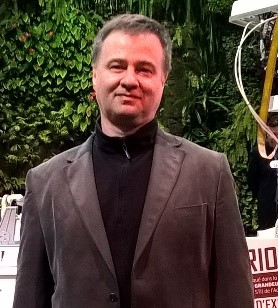
Dofinansowano z programu „Społeczna odpowiedzialność nauki” Ministra Edukacji i Nauki.

Gdy letnią nocą leżymy na plaży i wpatrujemy się w rozgwieżdżone niebo, towarzyszy nam uczucie spokoju. A w tym samym czasie Wszechświatem wstrząsają gigantyczne kataklizmy! Masywne gwiazdy wybuchają jako supernowe. Ogromna grawitacja supermasywnych czarnych dziur rozrywa zabłąkane gwiazdy, a gwiazdy neutronowe rozrywają się nawzajem, by następnie w ułamku sekundy scalić się w czarną dziurę.
W efekcie tych zdarzeń, we Wszechświecie powstają ciężkie pierwiastki. Te same, które są tak ważne dla funkcjonowania naszych organizmów. Pomagają także poznawać kosmos. Zapraszamy na wykład dr. Mariusza Gromadzkiego, który opowie o kosmicznych kataklizmach, pokaże jak się je odkrywa i bada.
Dofinansowano z programu „Społeczna odpowiedzialność nauki” Ministra Edukacji i Nauki.

Carl Sagan stwierdził, że wszyscy jesteśmy stworzeni z kosmicznego pyłu. I chociaż o badaniu pyłu w kosmosie niewiele się mówi, jest to jedna z najważniejszych dziedzin we współczesnej astronomii. Od obłoków, w których powstają gwiazdy, przez protoplanetarne dyski formujące planety po odległe galaktyki – pył kosmiczny jest obecny wszędzie i odgrywa niezwykle ważną rolę w kształtowaniu Wszechświata takiego, jaki znamy. Od jego interakcji ze światłem gwiazd zależy, co możemy na niebie zobaczyć, a co pozostaje ukryte przed promieniowaniem widzialnym i wymaga stosowania innych technik obserwacyjnych. W niewidocznych, ukrytych zakamarkach Wszechświata pył wpływa na ewolucję gwiazd i planet.
W wykładzie dr Aleksandra Hamanowicz przedstawi kulisy badań nad kosmicznym pyłem. Odkryje przed nami intrygujące metody badania tego, co niewidzialne, oraz opowie o najnowszej wielkiej misji kosmicznej Teleskopu Jamesa Webba.
 Dr Aleksandra Hamanowicz pracuje w Space Telescope Science Institute w Baltimore (USA), instytucji odpowiedzialnej za wielkie misje kosmicznych teleskopów. Doktorat realizowała w Europejskim Obserwatorium Południowym w Garchinig koło Monachium (Niemcy). Zajmuje się materią międzygwiazdową i międzygalaktyczną oraz ewolucją gazu i pyłu w historii Wszechświata. Wykorzystując dane z teleskopów naziemnych i kosmicznych, prowadzi badania, które obejmują obserwacje na różnych długościach fali – od radioastronomii po promieniowanie widzialne. Pochodzi z Wydmin, niewielkiej miejscowości na Mazurach.
Dr Aleksandra Hamanowicz pracuje w Space Telescope Science Institute w Baltimore (USA), instytucji odpowiedzialnej za wielkie misje kosmicznych teleskopów. Doktorat realizowała w Europejskim Obserwatorium Południowym w Garchinig koło Monachium (Niemcy). Zajmuje się materią międzygwiazdową i międzygalaktyczną oraz ewolucją gazu i pyłu w historii Wszechświata. Wykorzystując dane z teleskopów naziemnych i kosmicznych, prowadzi badania, które obejmują obserwacje na różnych długościach fali – od radioastronomii po promieniowanie widzialne. Pochodzi z Wydmin, niewielkiej miejscowości na Mazurach.
Dofinansowano z programu „Społeczna odpowiedzialność nauki” Ministra Edukacji i Nauki.

Czy zamieszkamy na Marsie? Zbudujemy tam pierwsze miasto? Jak będzie wyglądało codzienne życie na Czerwonej Planecie? Przenieście się 50 lat w przyszłość i poznajcie rozwiązania, które pomogłyby nam przetrwać na obcej planecie.
W 2019 r. odbył się międzynarodowy konkurs na kompleksową koncepcję kolonii na Marsie dla tysiąca osób. Drugie miejsce zdobył w nim polski projekt Twardowsky. Propozycja autorstwa zespołu Politechniki Wrocławskiej została także uznana za najlepszą pod względem projektu i technologii prozdrowotnych. Konkursowe koncepcje oceniane były przez specjalistów z NASA, SpaceX oraz prezydenta The Mars Society.
Zapraszamy na spotkanie z kosmicznym architektem Leszkiem Orzechowskim – koordynatorem projektu kolonii Twardowsky.
Leszek Orzechowski – koordynator projektu kolonii Twardowsky, kosmiczny architekt z zespołu Space is More oraz projektant i dyrektor pierwszego w Polsce habitatu analogowego LunAres. Kierując pracami zespołu projektowego Space is More zdobył umiejętność kompleksowego podejścia do projektowania kosmicznej architektury oraz dostrzegania jej znaczenia dla naszego ziemskiego społeczeństwa. Jako architekt integruje i stara się odnaleźć synergię między rozwiązaniami specjalistów z różnych dziedzin nauki. Jego projekty znajdują uznanie u światowych specjalistów aeronautyki, czego przykładem mogą być: wygrana w konkursie Marsception (na projekt stacji na Czerwonej Planecie), zwycięska koncepcja stacji na Fobosie, czy finał głośnego konkursu NASA 3d-printed Habitat Challenge (tworzenie archiktetury na Marsie). W ramach pracy naukowej pisze doktorat z klasyfikacji architektury habitatów analogowych służących symulowaniu załogowych misji kosmicznych, uczestnicząc w pracach kilku placówek na świecie.
Dofinansowano z programu „Społeczna odpowiedzialność nauki” Ministra Edukacji i Nauki.

Wszechświat nie przestaje nas zaskakiwać. Ogromny postęp technik obserwacyjnych pozwala nam sięgać coraz dalej w odległy Kosmos i poznawać coraz więcej jego sekretów. Wiemy o nim coraz więcej, ale czy coraz lepiej go rozumiemy?
Wszechświat w największych skalach obserwujemy dziś w pełnym zakresie fal elektromagnetycznych, łowimy nadlatujące z niego cząstki takie jak neutrina, a od niedawna – dzięki falom grawitacyjnym – również go „słuchamy”. Tego rodzaju obserwacje – wsparte zaawansowanym modelowaniem komputerowym i interpretowane poprzez modele teoretyczne oparte na ogólnej teorii względności Einsteina – wskazują na bardzo peryferyjną rolę ludzkości na kosmicznej scenie. Mieszkamy w pobliżu przeciętnej gwiazdy na obrzeżach przeciętnej galaktyki. Co więcej, większość kosmicznej materii, która jest odmienna od tej znanej z życia codziennego i laboratoriów, ma nieznaną nam dotąd „ciemną” formę. Jakby tego było mało, zachowanie Wszechświata w największych skalach napędza niezrozumiała „ciemna energia”. Podczas wykładu dr Maciej Bilicki opowie o tym, jak doszliśmy do tak zaskakujących wniosków, i pokrótce omówi planowane wielkie projekty obserwacyjne, które mają nam pomóc zrozumieć, z czego tak naprawdę zbudowany jest Wszechświat.
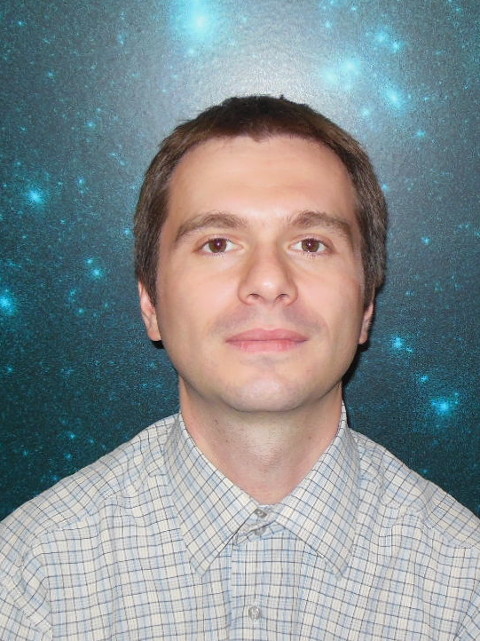 Dr Maciej Bilicki – kosmolog związany z Centrum Fizyki Teoretycznej PAN. Zajmuje się strukturą wielkoskalową Wszechświata, wielkimi przeglądami nieba i zastosowaniami uczenia maszynowego w astrofizyce. Jest zaangażowany w międzynarodowe projekty obserwacyjne poświęcone badaniom rozkładu materii w największych skalach, takie jak Kilo-Degree Survey (KiDS) czy Galaxy And Mass Assembly (GAMA). Pracuje także w polskim konsorcjum Obserwatorium Very Rubin przygotowującym przegląd Legacy Survey of Space and Time (LSST). Doktorat uzyskał w Centrum Astronomicznym im. Mikołaja Kopernika PAN w Warszawie, następnie pracował na Uniwersytecie Kapsztadzkim (RPA) oraz w Obserwatorium w Lejdzie (Niderlandy). W CFT PAN współpracuje przy rozwijaniu nowopowstałej Grupy Kosmologii Obliczeniowej.
Dr Maciej Bilicki – kosmolog związany z Centrum Fizyki Teoretycznej PAN. Zajmuje się strukturą wielkoskalową Wszechświata, wielkimi przeglądami nieba i zastosowaniami uczenia maszynowego w astrofizyce. Jest zaangażowany w międzynarodowe projekty obserwacyjne poświęcone badaniom rozkładu materii w największych skalach, takie jak Kilo-Degree Survey (KiDS) czy Galaxy And Mass Assembly (GAMA). Pracuje także w polskim konsorcjum Obserwatorium Very Rubin przygotowującym przegląd Legacy Survey of Space and Time (LSST). Doktorat uzyskał w Centrum Astronomicznym im. Mikołaja Kopernika PAN w Warszawie, następnie pracował na Uniwersytecie Kapsztadzkim (RPA) oraz w Obserwatorium w Lejdzie (Niderlandy). W CFT PAN współpracuje przy rozwijaniu nowopowstałej Grupy Kosmologii Obliczeniowej.
Dofinansowano z programu „Społeczna odpowiedzialność nauki” Ministra Edukacji i Nauki.

OBEJRZYJ TRANSMISJĘ NA YOUTUBE.COM Czarne dziury to jedne z najbardziej niezwykłych i tajemniczych obiektów we Wszechświecie. W ostatnich latach nastąpił ogromny postęp w naszych badaniach nad nimi. Dziś potrafimy czarne dziury „usłyszeć” wykorzystując fale grawitacyjne i „zobaczyć” wykorzystując fale radiowe. Niezwykłe odkrycia związane z tymi obiektami zostały docenione Nagrodą Nobla w 2017 oraz w najnowszej edycji w 2020. O tym co nowego widać i słychać w nauce o czarnych dziurach, za co dokładnie przyznano Nagrody Nobla i czego jeszcze możemy spodziewać się w niedalekiej przyszłości opowie astrofizyk Maciek Wielgus. Maciek Wielgus jest astrofizykiem pracującym w Black Hole Initiative na Uniwersytecie Harvarda. Zajmuje się radioastronomią, teorią akrecji i ogólną teorią względności. Jest absolwentem Politechniki Warszawskiej i Uniwersytetu Warszawskiego, od 2010 związany naukowo z Centrum Astronomicznym im. Mikołaja Kopernika PAN w Warszawie. Maciek jest członkiem kolaboracji Teleskop Horyzontu Zdarzeń, która w roku 2019 opublikowała pierwszy obraz super masywnej czarnej dziury w centrum galaktyki M87. Dofinansowano z programu „Społeczna odpowiedzialność nauki” Ministra Edukacji i Nauki.

Sign up!
Ticket availability for each attraction at purchase time can differ from the information provided on the website below. To see the exact number of available tickets at a given moment, log into your account at bilety.copernicus.org.pl/en. Remember, we sell tickets online all the time – when you arrive at Copernicus, their number can be limited.
On the day of your visit, the availability of the Thinkatorium, Buzzz!, High Voltage Theatre, Robotic Theatre and laboratories may vary. You can find the current information on the site "Today at Copernicus".
All tickets for that day are already sold out.
Online tickets for the selected day are not available for sale.
